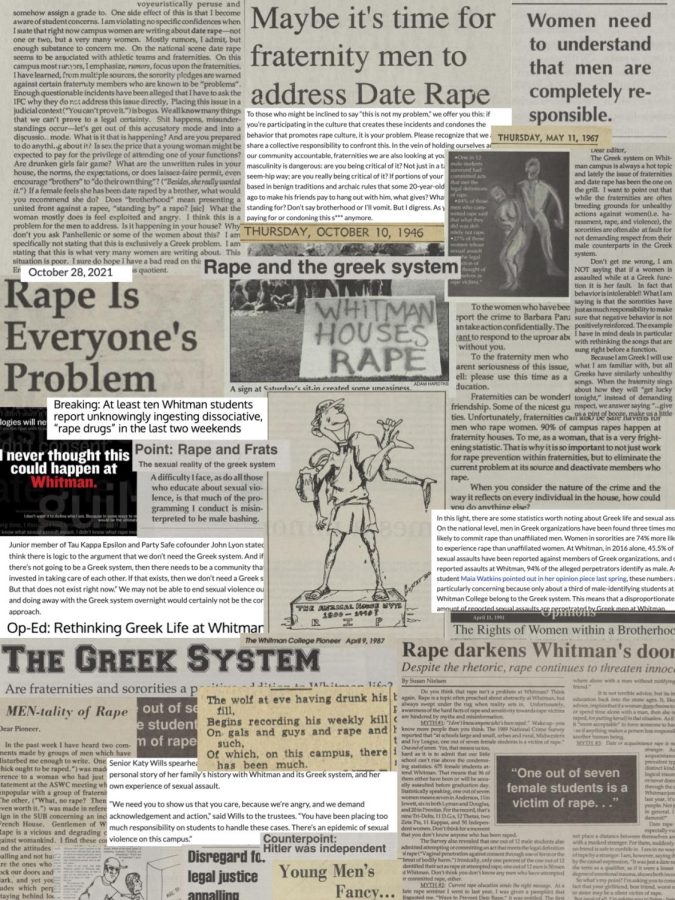EDITOR,
I graduated from Whitman College in 1993, and like most alums I have very fond memories of my Whitman experience. Two years ago, I moved back to Walla Walla with my family, and for the last two seasons I have helped out with the men’s and women’s cross-country teams. I consider myself a part of the Whitman family, and it is in that position that I write to express my concern with the change in direction that Whitman appears to be taking with respect to varsity athletics.
The recent decision to eliminate the varsity skiing programs brought my concerns into sharper focus. I understand that we are in the midst of a recession, that Whitman’s endowment has dropped by over $100 million, and that this has resulted in a decrease in the college’s operating budget. I also understand that Whitman, like other businesses nationwide, is struggling to figure out how to tighten its fiscal belt, and that ultimately the administration must make some difficult decisions for the college’s long-term well being. I do not envy the administration’s position, and I am quite certain that there have been many sleepless nights over at the president’s house. However, the decision to cut the varsity skiing programs pains me in that it meant cutting two of our family members loose (here I refer to the coaches: one of whom has been at the college for almost two decades: although ultimately we may also lose other family members in the form of students who transfer to another institution) in order to preserve and strengthen other athletic programs. While I know that times are hard, I do not believe we have reached the point where we are forced to choose between family members; rather, it seems that in addition to economic factors, this decision was made as part of a larger agenda to change the athletic culture at Whitman.
In his letter to the Whitman community explaining his decision, as well as in his public discussion on March 11, President Bridges emphasized the difficulty that the skiing programs have competing against NCAA Division I schools that can offer athletic scholarships. This lack of competitiveness is contrary to President Bridges’ stated desire of strengthen[ing] our athletic programs with the goal of achieving an increased level of excellence that enriches the competitive experience of our students and the reputation of the college.
In order to achieve this “increased level of excellence,” the college is willing to sacrifice some programs in order to emphasize others. Thus, not all of the savings from eliminating the skiing programs will be used to help the college tighten its fiscal belt; rather, $40,000 of it will be reallocated to other programs that better fit the college’s new athletic agenda.
My concern with this new athletic agenda is that it is a significant departure from the Whitman culture that I have always known. When I first came to Whitman in 1989, I joined the varsity soccer team. I had been a decent soccer player in high school, but I was overweight and came from a very small town that lacked any real competition. I quickly learned that my athletic skills were not on par with the majority of my teammates. Nonetheless, there was a place for me on the team. Despite the fact that I did not play at the highest level of excellence, I was allowed to participate, and by doing so my Whitman experience was greatly enriched. Two years later, I switched from soccer to cross-country. I had taken up running in the summers in an effort to get in shape for soccer, but I had never run competitively before. Once again, there was a place for me on the varsity team. Whitman recognized that participation in athletics can be rewarding in and of itself, regardless of whether you are the most competitive athlete on the field. During my two years on the cross-country team, I am not certain whether I ever impacted our overall team score; however, I still consider my college running experience to be an enriching success. Running on the cross-country team helped shape my life after Whitman: that overweight freshman who entered Whitman in 1989, still runs and will soon be heading to Boston to run his second Boston Marathon.
I have always respected the emphasis that Whitman has placed on being inclusive in everything it does. Whitman’s new emphasis on strengthening the athletic programs that it deems have the most chance of being successful, at the expense of others, is a move away from this unique inclusive culture. Whitman seems to be forgetting that success is not always about the end result: there are many athletes at Whitman who are successful, but who may never be all-Americans, may never win conference championships, and may never even count in their team’s overall score. Whitman’s athletic culture is changing, and not necessarily for the better. We just lost the skiing program. I fear that by abandoning our culture of inclusivity, we stand to lose much more.
– Damien J. Sinnot, ’93



Mark Sansom • May 12, 2009 at 3:41 pm
Just as Whitman is deciding to cut its skiing program, Liberty University is going in the opposite direction with a bold plan to develop year-round skiing for students.
http://bit.ly/16GCzk
Before making the decision to cut the ski program, was there any effort on the part of administrators to seek alternative funding sources for the team?
In England, a group of internet savvy soccer fans raised enough money, via online pledges, to purchase a national soccer team.
http://bit.ly/x6nPg
Skiing could and should come back to Whitman. What’s needed is a little creative collaboration, and administrative sanction to think outside the box.